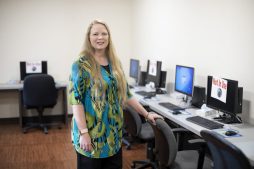Kandi McCracken frequently opens emails from thankful Citizen Potawatomi Nation members. As the education and learning lab counselor for CPN’s Workforce Development & Social Services Department, she walks Tribal members through the process of obtaining vocational scholarships.
“’I wanted to let you know with the help of the Potawatomi that I have a job that pays well enough to take care of my family. There will no longer be struggles between paycheck to paycheck,’” McCracken read aloud. “So, that was one that we just funded last semester, and she graduated with it. … She had turned in a letter from her employer that said getting this, she would get a better paying job, and she says she did.”

That woman became a histotechnician — a clinical laboratory technician that specializes in preparing samples for microscopic review by a pathologist — with the help of the program. While this client obtained a niche certification, some of the most popular areas of vocational study include cosmetology, nursing
and dentistry.
“We just handle anybody that wouldn’t fit the mold for going back to school but still wants to further their education and advance their careers,” McCracken said. “Most of them are already working, and they just need to advance their career, or they want to change their career path but don’t want to go back to college.”
CPN citizens in the United States, its territories, and Canada —as of April 2018 — qualify for application consideration. Part-time students (11 hours or less per semester, or 95 hours or less per month) receive up to $750 and full-time students up to $2,000.
The department’s scholarship program became available to incarcerated students as of July 1, 2018. It helps them earn skills training during the last three years of their sentence with strict requirements. The certifications, in addition to the Tribe’s re-entry program, makes their transition smoother.
McCracken believes vocational schools present a good opportunity for people wanting to advance their careers without going back to school or simply wanting to work.
“Life happens,” McCracken said. “So, we deal with it as we go.”
CPN accepts vocational scholarship applications throughout the year because classes begin and end more frequently than college or university schedules. However, leaving adequate time for approval, processing and payment before the classes end without the convenience of an online portal requires diligence.
“We’re still old school, paper copy,” McCracken said. “We can fax, mail, or email an application, but we do ask for the application back. Our application is quite lengthy.”
Workforce Development & Social Services requires a letter or job description from a current or potential employer as part of the application to validate the education’s necessity. Approved applications also provide proof of what McCracken refers to as an “unmet need,” meaning a portion of tuition and fees remains unpaid after financial aid and other scholarships.
To continue receiving assistance, recipients must turn in their grades following each class and maintain a 2.0 GPA. The program awards funds for one career path at a time and issues money to schools directly.
“I just want people to know that they can. All of these continuing education courses that they’re having to take, that is something that we can assist with. A lot of people didn’t know that,” McCracken said. “Anything that would tie to a job, that’s something that we can assist with. If their job requires it, it’s probably going to fall under the scholarship.”
For more information, visit cpn.news/workforcess or call 405-878-3854. Career opportunities at Citizen Potawatomi Nation are also available at FireLakeJobs.com.
